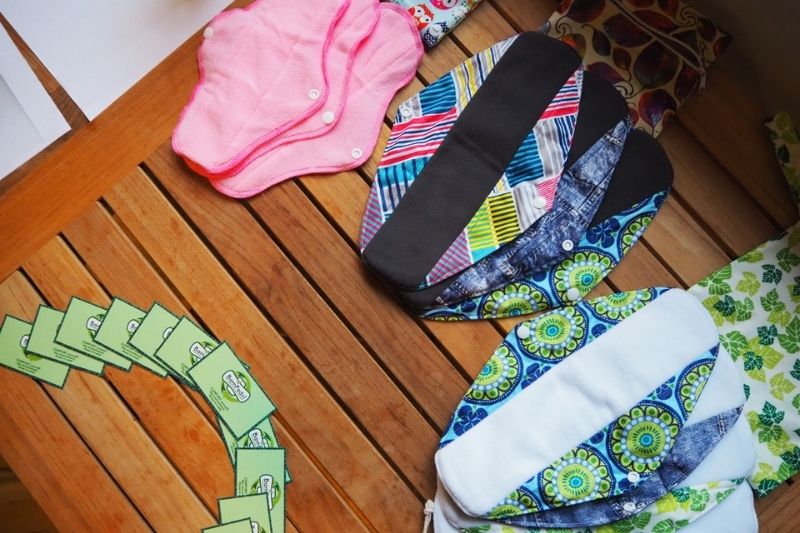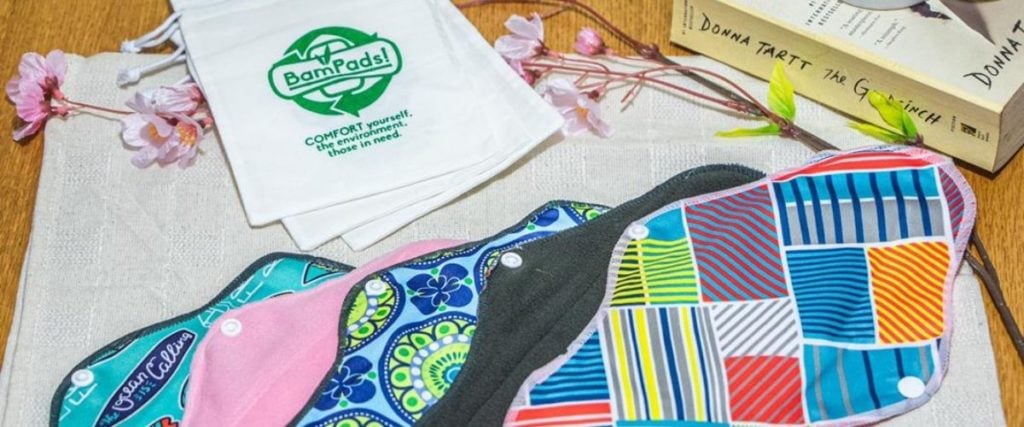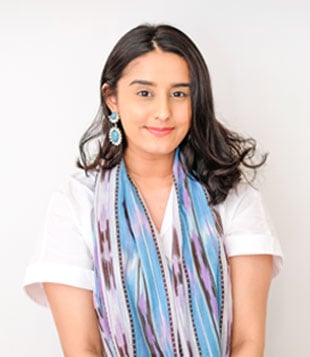Not only does BamPads! care about making period products more sustainable with their reusable pads, but they are also taking care of the planet and your wallet. The Hive Life team speaks to BamPads!’ CEO and founder Sakshi Vasudev and Head of Marketing Neha Khairpuri about their entrepreneurial story, the work they do with their company, and how they are disrupting the stigma many people face surrounding periods.
Sakshi Vasudev is the CEO and Founder of BamPads!, a 19 year old looking to change the future of sustainable menstruation. Not only does the company offer reusable pads in the funkiest designs you have seen, but they also educate menstruators globally on topics that many usually shy away from, with hopes to tackle period stigmatisation. Accompanying her during her interview, is friend and Head of Marketing of BamPads!, Neha Khairpuri, who also shares her views on the above topics. The gamechangers walk us through how they aim to educate society, what issues they are hoping to tackle with their team of six inspiring individuals, and their personal experiences with periods.
Can you tell us a little about BamPads!
“BamPads! is a youth social startup where we sell reusable cloth menstrual pads made in China. I started it back in May 2019, when my father was the first one who gave me my first set of reusable pads. I realised that my journey with periods has been really bad. Using a reusable pad was an eye-opening experience to a better period. You know – there were no more rashes, no more yeast infections every month that I used to suffer from when I had disposable pads. The more research I did, the more I realised that disposable pads are actually made of plastic – which is something we don’t normally know,” Sakshi starts.
She continues, “When I posted my very first reusable pad on Instagram – I got a lot of feedback! People were asking ‘What is this, how do you use it, how do you wash it? Why should we switch to this? Is there something we’re missing out on that we don’t know of?’ And then I thought to myself – this is a business opportunity – no one’s talking about periods the way it’s supposed to be spoken about! So I realised that we could be the first young person to talk about periods and to destigmatise talking about them.”

What are BamPads! made of?
Neha explains, “The top layer is microfleece. Below that, we have two layers of microfiber which is very absorbent material to carry blood. And then the last layer is pul – which is the waterproof material, so our users don’t experience any leaks. Our pads currently come in five different designs! Check them out here.”
Can you walk us through your process of choosing the right materials for the pads?
Sakshi says, “We went to the factory and they had all these different fabrics to choose from. There was organic cotton, microfleece, bamboo charcoal, bamboo terry, terra bamboo, hemp, and so much more! As someone who had no knowledge of fabrics or whatsoever, you can imagine how confused and overwhelmed I felt. I was lucky enough to have an incredibly patient supplier who made the process so much easier! She would send me pieces of fabrics and I would feel them to see which one felt comfortable and easy to use.”
“The first thing that sets us apart from other competitors is that all our fabrics are being shipped from China to Hong Kong, which means our shipping costs are significantly less. Secondly, when I had the samples made, the rim was very thick – which means you could feel the pad if you wore them. This was something I discussed with my supplier and we fixed it! Now, it’s so thin- you won’t even feel like it’s there when you’re wearing it. The aim is to bring the utmost comfortability so that every woman can enjoy wearing her pad,” Sakshi interprets.

How do you take proper care of your reusable pads to make sure that they can be worn for at least two years?
“Firstly, we recommend washing your used pad with cold water to rinse out all the blood until it runs clear. Next, use a bit of detergent and rinse off. As long as you’re being gentle with it, your pad can definitely last you quite a long time. Additionally, you can also put it in your washing machine- it won’t get too damaged there,” says Neha.
Neha also shares, “I personally believe a reusable pad can last you longer than two years! However, it also depends on the buildup of blood in one’s body. Just be gentle with it, think of it as a very fragile piece of material. Once you start rubbing off a layer, it definitely will affect the quality of your pad. My main piece of advice: be gentle.”
How is the material friendly to our bodies?
“A friendly reminder to every woman using disposable pads- yes, they are made of plastic, but they also contain chemicals such as carcinogens and bleached cotton fragrances which can seriously mess with the pH value of your vagina. Not a lot of people know this but the fishy smell you get is from the blood mixing with the toxins in a disposable pad. Periods are supposed to be scentless,” says Sakshi.
She shares that, “From my personal experience, I was wearing a disposable pad for fifteen to sixteen hours this one time when we had physical education in school, and a friend of mine pointed out a bad smell. Additionally, when we conducted workshops, we learnt that a lot of people thought that this ‘bad smell’ was normal. This is because no one talks about periods. We think it’s normal- it’s not. Switching to reusable pads, I managed to get rid of all those problems, from rashes to bad odour.”
What about our planet, how are reusable pads environmentally friendly?
“Disposable pads are practically 90% plastic. It takes 500 to 800 years to decompose just one pad. On average, a woman uses around 11,000 to 13,000 pads in a lifetime. Now just imagine the waste we’re creating,” explains Sakshi.
“Moving on, let’s talk about the costs we spend on pads. One of our team members did her own research on her monthly costs and it came down to around HK$170 (US$22) per month for period care- this involved pads, snacks, and medicine. Yes we understand that periods are a natural thing, but we’re still paying extra for resources that should be free. With BamPads!, we want to bring not only comfortability but also affordability, which is why we have two different pricing models: one for full-time employed adults, and one for students,” she follows.

Can you tell us more about the work you are doing to combat period poverty?
Neha explains, “To us, period poverty basically refers to the lack of hygiene that women face when having periods. It’s the lack of water to clean yourself, the lack of proper disposal methods. Sometimes people don’t have the dustbin to dispose of their pads in and it ends up somewhere along the streets or the ocean. Period poverty is something we’re trying to bring more awareness of. We’ve been doing this by holding events, reaching out to people and explaining the term. We’re trying to hit two birds with one stone: helping those in need who don’t have access to the resources they need, and playing our part in saving the planet.”
How do you aim to educate these women?
Sakshi says, “BamPads! has done two donations [programmes], one by selling at cost to Aama Ko Koseli and secondly, by donating to the Refugee Union during Christmas. One thing we did miss out on was that we were in a hurry to give these pads to the refugees – we didn’t hold workshops due to Covid-19. It was almost impossible to gather so many people at one place for a workshop. The feedback we got was that, out of 40 in total, they had 4-5 women use the pads. The good news is – we have a workshop with them this summer!”

How can we get our society to be more open-minded about periods?
“Growing up, I never talked about periods with my friends or family. When I first switched to the cup, it was a game changer. I wanted to tell everyone about it. Moving on to the bigger picture: in Asia, you don’t talk about blood, you don’t talk about feminine problems, it’s just the norm,” Neha explains.
Sakshi follows, “We need to be more open. People around us need the knowledge. We learn about menstruation in school, but it’s the smallest chapter, and then we quickly scroll past. We need to learn to approach the problem – not be the problem. It’s funny how all girls are just expected to know how to use a pad. When I used my first pad, I had no idea how to change it. I woke up in the middle of the night and my bed was covered in blood. I didn’t know what to do. I tried to hide the mess as much as I could up until my mum asked me why I didn’t go to her for help. If we were just able to talk to people about topics like periods, it wouldn’t be such a hassle for people around the world, and it definitely wouldn’t be a topic to shy away from.”
She further follows, “The stigma around periods is that it’s a hush hush topic. It’s a private matter when it’s not supposed to be. Unfortunately, most people know more about the anatomy of a frog body than the female body. It’s an important topic and we should get on board with it for sure,”
How can we start conversations with our loved ones, even if they feel shameful about the subject, to normalise speaking about menstruation?
“Don’t beat around the bush – talk about it. Let me give you an example: I’m the eldest of my two younger sisters who will be starting their period soon. I walked her through the process of it and she said she was scared. I reassured her she had nothing to worry about,” explains Sakshi.
“Despite being the only male in the family, my dad was super supportive and on-board with me starting BamPads! I loved that he was asking questions such as, ‘What’s a panty liner?’ and ‘How do pads work?’ It shows that he’s willing to learn more and I’m sure there are so many other people out there who are too. It’s just our society being restrictive. At this point, talking about periods is a very comfortable topic between me and my dad,” says Sakshi.
Neha adds, “A few months ago, I was walking with my boyfriend and he slipped and started bleeding really badly. I had a panty liner in my bag and told him to stick this on since there was no first aid nearby. It was something he had a bunch of questions about – but again, he was learning something new because we were talking about it. I’ve also played period bingo with my boyfriend and he scored pretty well: 80%!” She continues, “When I have my period, I get moody, bad cramps, and this is something I will voice out in front of my loved ones. Pointing out these little things can make such a huge difference.”
Sakshi finishes, “This reminds me of the time when I was back in India and since I didn’t know what a pad was I told my grandma: ‘Did you know mum still wears diapers?’”

What can we look forward to Bampads! doing with your workshops?
Neha says, “Going forward, that’s what we’ll be doing [workshops]. With refugees, it’s a complicated situation. Additionally, instead of giving out pads in mass, we will have small groups of 10 and before giving it to them, they can fill a form so we can learn if they’re interested in knowing more or not so we’re not wasting our resources.”
What is BamPads! hoping to achieve in the future?
Sakshi finishes, “We are working on explaining the basic anatomy of menstruation workshops. I’m a big advocate for education- I consider myself incredibly lucky that I was able to receive the education I did. Unfortunately, not a lot of girls are able to do that back home in India or in other parts of the world. Some people in villages don’t even know what periods are to begin with. In some cities around the world, a woman is expected to drop out of school once she starts bleeding. She’s considered a woman and she’s married off. She’s considered more of a liability than an asset just because she bleeds. Every girl deserves the right to equal education as boys get. Only then, our world will progress.”
Related Articles
LUÜNA: Tackling Stigma, Shame & Silence Around Periods Across Asia
Powerpants by Bham: Australian Social Enterprise Takes a Stand Against Gender Violence





